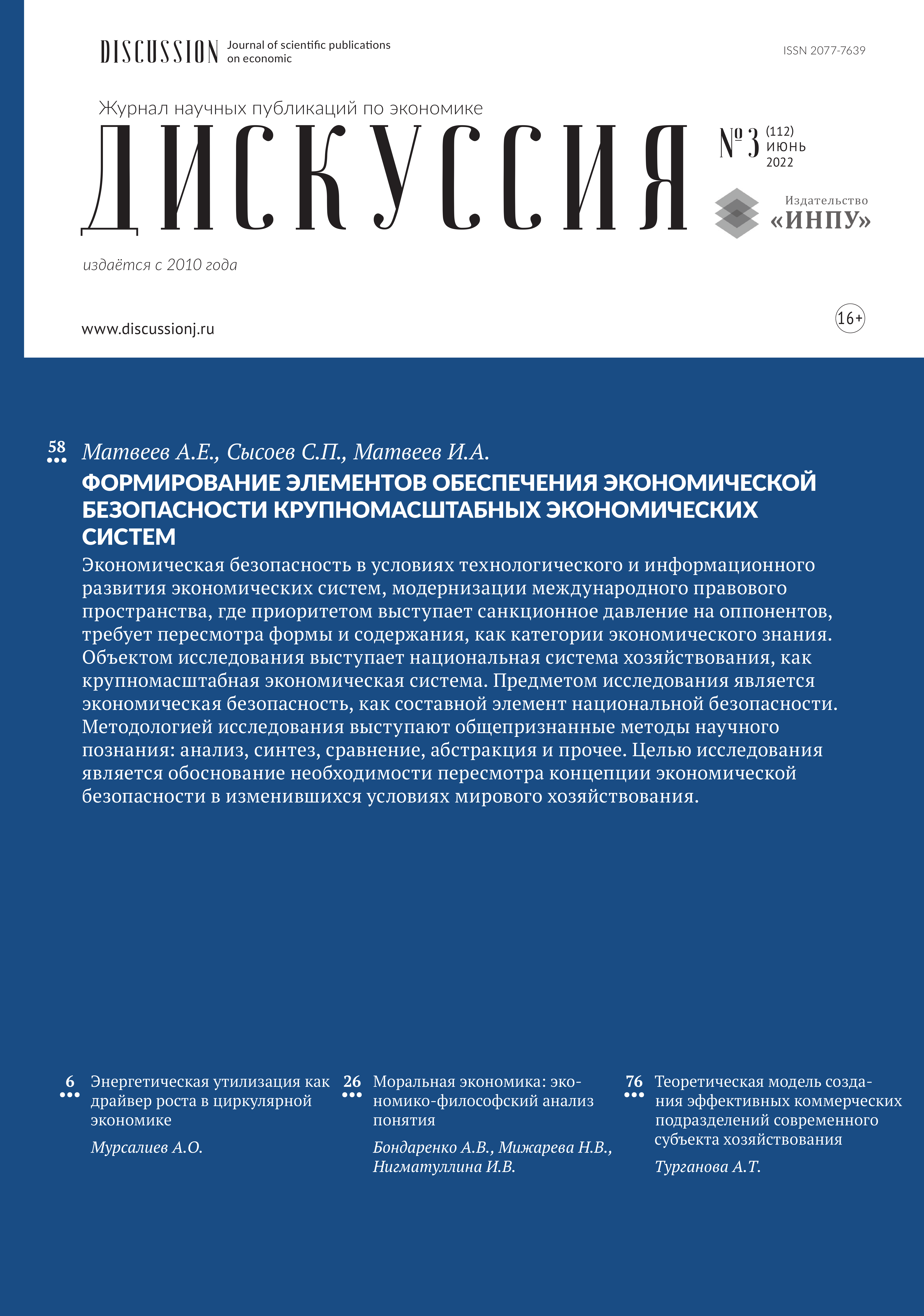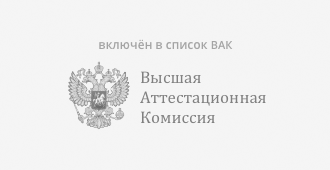Moral economics: economic and philosophical analysis of the concept
Keywords:
Moral economy, economic man, morality, exchange value, ethics, welfare, societyAbstract
Fancy names of subject areas of scientific knowledge in the modern scientific world, like nothing else, reflect the excessive consumption in society. The variety of choices that postulates human freedom eventually turns into chaos: something that is neither controlled, nor measured, nor regulated, nor, in the end, amenable to ordinary formal logic. Socionomics, socieconomics, social economics, solidarity economics, sociological economics, etc., no amount of abstract is enough to list only combinations of social and economic. But, if you undertake to list, for example, combinations of ecology and economics, then there will be such a number of directions that a reasonable person will have a natural question: the global issues facing humanity from year to year are the same, the answers are the same, and the number of directions that are theorizing, explaining, measuring, evaluating the same phenomena is increasing. And the completion of such a variety of theories and currents of economic thought is moral economics, in the essence and content of which there are absolute antipodes that disorient the axiological space of modern society. In this study, the authors will try to use scientific methods of cognition that have a philosophical basis to reveal the nature of the appearance of contradictions in economic knowledge when materialized matters are mixed with spiritual values. The necessity, causal mechanisms of occurrence are considered, the objectivity of the need for the presence of moral signs of economic processes is studied. The subject of the study is moral economics, as a characteristic example of an absolutely contradictory axiological and economic phenomenon. The aim of the research is a theoretical analysis of the truth of the synthesis of morality and economics in the modern social formation. The materials and results of the study are: 1. Theoretical analysis of the subject area, expressed in three main sections: The history of the issue, Morality, ethics and economics, general logical understanding of concepts, Ethics of morality and ethics of economics; 2. Formal and logical argumentation of the inconsistency of the causality of the presence of morality in the economy of D. M. Hausman; 3. Argumentation of the absence of signs of convergence of morality and economics at the present stage of economic formation.
Downloads
Metrics
References
Чаянов, А. В. Организация крестьянского хозяйства / А. В. Чаянов. – Москва : Академический Проект, 2015. – 363 с. – ISBN 978-5-8291-1729-0. – EDN VRSFLR.
Смит А. Богатство народов //П. Дж. O'Pypк; пер. с англ. Л. Кисляковой. – 1935.
Сорокин, А. И. Экономическая теория о роли и месте предпринимателя в общественном производстве / А. И. Сорокин // Журнал правовых и экономических исследований. – 2022. – № 1. – С. 219-226. – DOI: 10.26163/GIEF.2022.47.46.031. – EDN JGOVRQ.
Thompson E. P. The moral economy of the English crowd in the eighteenth century //Past & present. – 1971. – №. 50. – С. 76-136.
Scott J. C. The moral economy of the peasant //The Moral Economy of the Peasant. – Yale University Press, 1977.- С. 254.- DOI: 10.12987/9780300185553.
Boulding K. E. Economics as a moral science //The American Economic Review. – 1969. – Т. 59. – №. 1. – С. 1-12.
Boulding K. E. The economics of the coming spaceship earth //New York. – 1966. – С. 1-17.
Quinault R., Stevenson J. (ed.). Popular protest and public order: six studies in British history, 1790–1920. – Routledge, 2021. – Т. 17.
Большая советская энциклопедия. [Электронный ресурс]. - URL: https://gufo.me/dict/bse, дата обращения 01.08.2022.
Чаплыгина И. Г. " Экономический человек" Дж. С. Милля и А. Смита: методологический аспект //Научные исследования экономического факультета. Электронный журнал. – 2015. – Т. 7. – №. 2. – С. 15-27.
Философская энциклопедия. [Электронный ресурс]. - URL: https://dic.academic.ru/contents.nsf/enc_philosophy/, дата обращения 01.08.2022.
Философский словарь Спонвиля. [Электронный ресурс]. - URL: https://philosophy_sponville.academic.ru/, дата обращения 01.08.2022.
Райзберг Б.А., Лозовский Л.Ш., Стародубцева Е.Б.. Современный экономический словарь. -2-е изд., испр. М.: ИНФРА-М. 479 с.. 1999.
Carrier J. G. Moral economy: What’s in a name //Anthropological Theory. – 2018. – Т. 18. – №. 1. – С. 18-35.- DOI: 10.1177/1463499617735259.
Самуэль Б. Моральная экономика: почему хорошие стимулы не заменят хороших граждан //Экономическая социология. – 2016. – Т. 17. – №. 4. – С. 100-128.
Ивашковский, С. Экономика и этика: история непростых взаимоотношений / С. Ивашковский // Экономическая политика. – 2011. – № 3. – С. 114-141. – EDN NULJZL.
Маркс К., Энгельс Ф., Ленин В. И. О морали и нравственном воспитании. – Политиздат, 1985.-528 с.
Маслеев, А. Г. Мораль и этика в современном мире / А. Г. Маслеев // Новые идеи в философии. – 2014. – Т. 2. – № 1(22). – С. 77-82. – EDN SUFZFL.
Hausman D. M., McPherson M. S. Taking ethics seriously: economics and contemporary moral philosophy //Journal of economic literature. – 1993. – Т. 31. – №. 2. – С. 671-731.
Barber J. Economic sanctions as a policy instrument //International Affairs (Royal Institute of International Affairs 1944-). – 1979. – Т. 55. – №. 3. – С. 367-384.- DOI: 10.2307/2615145.
Friedman M. The social responsibility of business is to increase its profits //Corporate ethics and corporate governance. – Springer, Berlin, Heidelberg, 2007. – С. 173-178.- DOI: 10.1007/978-3-540-70818-6_14.
Mulligan T. A critique of Milton Friedman's essay ‘the social responsibility of business is to increase its profits’ //Journal of Business Ethics. – 1986. – Т. 5. – №. 4. – С. 265-269.- DOI: 10.1007/BF00383091.
Энгельс Ф. Анти-Дюринг/К. Маркс, Ф. Энгельс//Соч., Т. 20, 1931, с. 359.
Downloads
Published
How to Cite
Issue
Section
Categories
License
Copyright (c) 2022 А. В. Бондаренко , Н. В. Мижарева , И. В. Нигматуллина

This work is licensed under a Creative Commons Attribution-NonCommercial-NoDerivatives 4.0 International License.
Авторы, публикующие произведения в журнале «Дискуссия», соглашаются со следующими условиями:
- Авторы сохраняют за собой авторское право и предоставляют журналу право первой публикации произведения, одновременно лицензированной в соответствии с лицензией Creative Commons Attribution, позволяющей другим лицам пользоваться произведением с подтверждением авторства и первоначальной публикации в журнале «Дискуссия».
- Авторы вправе заключать с иными лицами лицензионные договоры на условиях простой (неисключительной) лицензии на использование опубликованного в журнале «Дискуссия» произведения (например, размещение его в базах данных университетов, публикация в книге), со ссылкой на его оригинальную публикацию в этом журнале.
- Автор гарантирует, что является правообладателем всех материалов, предоставляемых в редакцию, и что исключительные права на данные материалы не переданы или не предоставлены другим лицам.
- Авторам разрешено и рекомендуется размещать свое произведение в Интернете до и во время процесса подачи, поскольку это может привести к продуктивному обмену, а также к более раннему и более широкому цитированию опубликованных работ.
С момента загрузки произведения и сопроводительных материалов через раздел "Отправка материалов", автор полностью и безоговорочно принимает (акцептует) публичную оферту о заключении авторского соглашения об опубликовании произведения. В соотвтетствии с этим соглашением автор предоставляет издателю на безвозмездной основе неисключительную лицензию на использование созданного автором произведения.
С момента получения произведения и прилагаемых к нему материалов журнал "Дискуссия" вправе использовать полученные произведения без ограничений по своему усмотрению и в пределах всего срока действия исключительных прав, но с обязательным указанием имени автора (авторов) произведения, в том числе публиковать произведения (полностью или в сокращении) на территории всего мира, переводить на другие языки, направлять в репозитории научной информации, размещать в сети Интернет и использовать другими законными способами.









